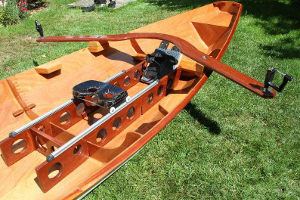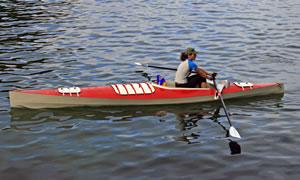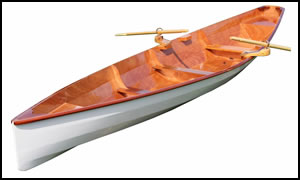Builder's Resources
This section provides further information and resources for plans and kit builders. The resources include supply lists, linesplans, build photo galleries, build videos, and more. Click on the following links to find the section you're interested in or scroll down to view all the resources:
- General Topics
- Hollow-Shaft Sculling Oars
- Bumblebee Sailboat
- Sliding Seat and Rigger System
- Expedition Rowboat
- Cambridge Racer
- Oxford Wherry
- RowCruiser
- Sailing RowCruiser
- Sailing Conversion System
- FAQs
You can also visit our Video and Photo Gallery Page for videos and photos, and read relevant articles in our Builder's Tips Blog.
Online Forum: And finally, we've just created a new builders' forum. This is the place to ask questions or share your knowledge with others in the community. You can find the forum here
General Topics
Interlocking Finger Joints - About Our SnapTite Joint System
Why Build - Benefits of Building Your Own Boat

Hollow-Shaft Sculling Oars
Everything You Need to Know About Sculling Oars
Photo Build Gallery for Hollow Shaft Oars
Photo Gallery of Hollow-Shaft Oars
View Sample Chapter for Hollow-Shaft Oars
View Plans Page for Hollow-Shaft Oars

Bumblebee Sailboat
Builder's Resource Page for Bumblebee Sailboat
Supply List for Bumblebee Sailboat
Watch a Video for Bumblebee Digital File Assembly
View photos from the Bumblebee Build Gallery
See a Photo Gallery of the Bumblebee Sailboat
Watch a video of 1 and 2 year old kids using the Bumblebee Sailboat
View Study Plans for Bumblebee
Diagram of Bumblebee CNC Cut Okoume Marine Plywood Components in Kit

Sliding Seat and Rigger System
Installation Instructions and Build Resources for Angus Sliding Seat and Rigger System
See Photos in Sliding Seat Build Gallery
Watch Video of Sliding Seat Rowing System
See Photos in Sliding Seat Gallery
View Kit Contents (displaying wooden seat)
Everything You Need to Know About Installing a Sliding Seat Rowing System
Instructions on Installing the Sliding Seat and Rigger System in the Oxford Wherry

Expedition Rowboat
View Diagram of Expedition Kit Wood Components
View List of Expedition Rowboat Kit Contents
View Expedition Rowboat Linesplans
Build Gallery for Expedition Rowboat

Cambridge Racer

Oxford Wherry
View the Oxford Wherry Kit Contents List
View the Oxford Wherry Plans Content List
View a slideshow of Oxford Wherry Kit Contents
View a diagram of Oxford Wherry Kit Wood Components
Instructions on Installing the Sliding Seat and Rigger System in the Oxford Wherry
Watch a video of the Oxford Wherry in action
View the Oxford Wherry Photo Gallery
View the Oxford Wherry Plans Page

RowCruiser
Article on Tents versus Camping in Rowboats
View the RowCruiser Photo Gallery
Visit Marty Loken's dedicated site on the RowCruiser
RowCruiser Community Facebook Page

Sailing RowCruiser
See Sailing RowCruiser linesplans
Sailing RowCruiser Supply List
Article about the design and inspiration behind the Sailing RowCruiser
Video of the Sailing RowCruiser
Photo Gallery of the Sailing RowCruiser
R2AK Training Video in Sailing RowCruiser
Electronic Tiller in Sailing RowCruiser
Sailing RowCruiser Community Facebook Page

Sailing Conversion Plans
See the Sailing Conversion System Photo Gallery
See Sailing Conversion System lines plans.
Wheelbarrow Dinghy

FAQS
-
What’s the best type of epoxy to use?
There is a large selection of epoxies on the market, and a huge variation in prices. West System has brand prominence, however, there are many other companies offering quality product. Raka, Mas, and System Three all offer a good product for a reasonable price.
-
What’s More Economical – building from plans or a kit?
It should be a little cheaper building from plans, but this isn’t always the case. Sourcing obscure materials can be challenging, and often you will be getting very un-competitive prices. You also need to factor in the time and gas used in just getting your materials. The satisfaction in building from plans comes not from the savings, but in the enjoyment of building your boat entirely from scratch.
-
How does your sliding rigger system compare with the Piantadosi Unit?
Like all things it comes down to personal preference. The Piantadosi system is a robust unit which most people have good things to say about. The downside is it is a little heavier, more expensive, and doesn’t have the aesthetics of a wooden system. Our sliding seat rigger system is lighter and offers a very smooth ride.
-
I plan on abusing my boat is one layer of fiberglass on the bottom sufficient?
Our philosophy is to create lightweight, but strong boats. A lighter boat will move faster, is much, much easier to manhandle out of the water and onto the roof of the car, and is all round a more elegant boat. While our boats can take a fair amount of wear and tear (and any amount of stress the waves can wreak upon them), we do recommend that you take basic easy precautions to reduce the wear such as not ramming it up onto gravelly beaches (come in sideways instead) and not dragging it over rough ground. In the long run, you’ll find it’s much easier having a light boat that you treat well rather than the effort of lugging around a tank that you can abuse. If you plan on using the boat as a rental or for a kids’ summer camp then yes, I would recommend adding additional fiber glass. For moderate abuse, add a couple of additional rub strips at the bow and stern and an extra later of glass across the bottom two panels. For heavy abuse, add an additional layer of glass cloth over the entire hull plus the additional layer across the bottom panels and hull/stern strips.
-
What’s the spelling of rowboat. Is it row boat or rowboat?
Rowboat
-
Why isn’t the rowing station more central in the Expedition?
A common misconception is that the rower should be in the center of the boat. While in many cases this is the ideal position, there are many factors to consider. The most important consideration is trim of the boat. The underwater profile of the boat changes depending on displacement (total weight) and center of gravity. Usually boats are designed so the ideal profile for tracking and performance is with the center of gravity just aft of the center of buoyancy. The Expedition is designed for carrying gear, and the storage space is optimized by having it in the central portion of the boat where it is widest. A light load should be carried further forward and a heavier load more centrally for ideal trim. When the Expedition is completely empty it is not quite at its ideal trim, however, it still performs and tracks very well.
Interestingly, while having the center of gravity near the center is generally best for performance it is not the ideal position for the rower from a steerage standpoint. As with a canoe, less force is required to steer from the stern and it is less effort for a rower to steer when positioned in the rear(with the trim balanced with additional weight forward). This layout is seldom utilized, however, for other practical reasons that trump ease of steering. Oars are so powerful that it is generally not an issue steering from the center of the boat.
